
Most educational researchers agree that involving parents in their children’s education is a powerful means of improving children’s academic performance. Research has shown that children whose parents spend time with them discussing their schoolwork have higher grades, test scores, graduation rates, and attendance. The research also shows that parent involvement in their children’s education had 10 times the impact of other factors (like socioeconomic status) on their children’s academic success. These children also have higher levels of self–esteem, and lower levels of drug use and school problems. Consider the fact that children spend 70 percent of their time someplace other than school. Not surprisingly, much of that time, particularly for younger children, is spent in the company of one or both parents. Researchers at the Northwest Regional Educational Laboratory have also found that the earlier parents become involved in their children’s education, the more beneficial are the results. The researchers also found that the most effective kind of involvement is around learning at home. Other research found that families whose children do well in school have six common characteristics: they have a daily routine for their children to follow; they monitor their children’s non–school activities; they model the value of learning; they set high expectations for their children, they encourage their children in school, and they encourage reading, writing and discussions at home. Finally, Dr. Joyce Epstein, a scholar at Johns Hopkins University reports on the importance of two–way communication between parents and teachers, that parents feel welcome in their children’s school and that they are partners in educational decisions that help their children succeed academically. As part of its commitment to improving instruction through Lesson Design Study, the Institute of Standards, Curriculum, and Assessment, an agency within United Teachers Los Angeles’ nonprofit foundation, hosted a parent conference to involve parents in their children’s education on Saturday, April 28, 2007. Nearly 10,000 flyers announcing the conference were sent home with students or mailed, and a few (200) were hand delivered to parents at meetings. Despite this enormous effort, only 166 parents were pre–registered, mostly by telephone, and 74 appeared for the conference. These 74 parents had children in one or more of three Los Angeles middle schools (Foshay Learning Center, Manual Arts Middle School, and John Muir Middle School) attended and learned how Lesson Design Study worked and how they could help their children. At the end of the conference, the Institute staff conducted a survey with an instrument that had been developed with Professor Wellford Wilms from UCLA and teachers from the three schools. Wilms also analyzed the results and wrote this report.
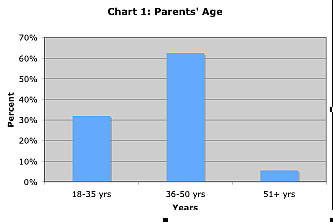
Parents were asked a number of questions to find out whether or not they valued the conference, how they felt about their schools and children’s teachers. As Chart 1 shows, slightly less than two thirds of all parents were between the ages of 36–50 years of age, with almost another third being between 18–35 years of age. Only a small percent were 51 years old or more. Parents were asked if they thought they would be able to use what they learned at the conference. As Chart 2 shows, nearly 100 percent of the parents agreed or agreed strongly that they could use what they learned. Only two percent strongly disagreed. (Click on graph to enlarge.)
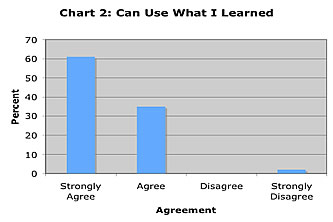
One parent said, "I love this activity..." and another elaborated saying, "After reading a story, I want to have my child write about what she learned from the book so she can learn writing skills." While many parents saw the value of helping to teach their children, others said that it was a "two way street" and that they learned from their children. One mother said, "I have learned a lot from my son." Parents were asked if they would like more meetings like this. As Chart 3 shows, parents were nearly unanimous in their agreement that they wanted more.
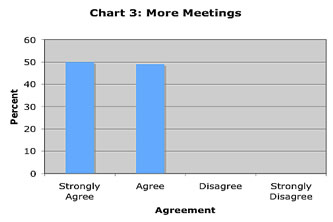
Many parents offered written comments and they were all positive: "Everything is good", "Now parents can show their children to improve their understanding", "It helped me understand my child’s schoolwork", and "It allows me to help when my child gets behind." Some other parents talked about the importance of getting more parents to come. One wrote, "We should break up the groups to get to know other parents and see what brought them here." Parents were also asked how they felt about their children’s school. One of the questions aimed to find out if parents felt welcome at school. Chart 5 shows that nearly all parents (97 percent) felt welcome at their children’s school.
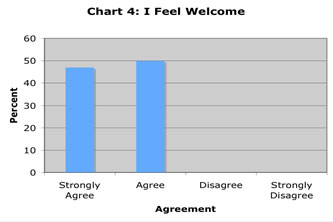
They were also asked what the school could do to make them feel even more welcome. Many comments were offered that "Everything is good", though some parents commented with ideas for improvement. Some said they wanted more communication from the school and "having more frequent meetings with teachers." Another parent commented that the school staff needed to have classes in how to be polite to parents because, "...there are people who are not [polite] and make parents feel bad." Yet another parent suggested that steps could be taken for "greeting and making parents feel that they are more welcome at school." Parents were also asked about the extent to which they were satisfied with communication with their children’s teachers. Chart 5 shows that the vast majority of parents (93 percent) were satisfied, but seven percent said they were not.
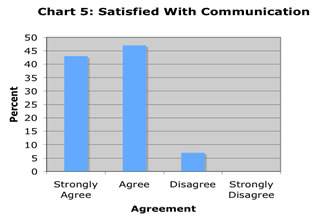
Parents were uniformly supportive of the translating service that Manual Arts High School and the Institute provided at the conference, and many said the schools should always make translators available. One parent suggested that teachers should speak Spanish. Most of the comments, however, pointed to the need for more frequent conferences with teachers, especially in cases where children were not doing well. One parent said, "When my son is failing I could be notified before receiving the report card." Another said, "Letting me know what my child isn’t doing in class before parent conferences by emails or a phone call." Another parent commented, "I need more personal time with the teacher to talk about my child’s progress." Finally, parents were asked to evaluate the quality of teaching their children were receiving. As Chart 6 shows, 93 percent of all parents agreed or agreed strongly that the teaching their children were getting was good teaching while a small percentage disagreed.
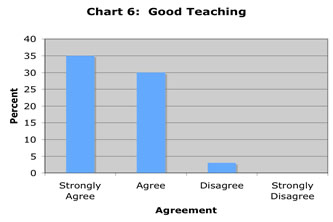
In the small number of cases where parents thought their children’s teaching was not as good as it could be, they were most likely to say they wished for more communication with the teachers. One said that teachers should also communicate with the children, "…having more communication with children so that there is more trust." (One parent commented that improvements from her supporting her child’s education.)
Summary and ConclusionsOverall, these results show a resounding amount of support these parents express about their children’s schools and teachers. Parents made it clear how much they valued the Institute’s conference because they were better able to understand how to become better advocates for their children and they found what they learned to be useful. The vast majority reported that they were pleased with their children’s schools and their teaching, but they offered a large number of comments that point toward the need for more communication with teachers, and finding new ways of involving themselves in their children’s education. In light of preponderance of research that indicates the difficulty of getting parents involved, findings from this survey make it clear that at least among these 74 parents, there is a great reservoir of good will and desire to become more involved. But, these relatively few parents are clearly a highly self–selected group of more than 10,000 parents. Because they chose to attend it is not surprising that they should hold such positive attitudes.
The remaining job for the Institute, working in conjunction with United Teachers Los Angeles and the schools, is to find ways to build from this small but powerful base of support to include larger numbers of parents. Some have suggested using a conference format like this one as a substitute for the traditional "back to school night" because parents who attended said they received such great value from it. Another idea is to work through the parents who attended this conference. With their help, the Institute and the schools could develop workshops for parents of similar national origins including those from El Salvador, Nicaragua, Guatemala, Belize, and Mexico, as a first step to larger parent conferences. These parents, because of the natural affinity they hold for one another, tend to congregate in institutions in their communities. Providing information on their children’s schools where the parents naturally congregate may lead to greater parent involvement that is so necessary for their children’s success.
By Wellford W. Wilms, Department of Education University of California, Los Angeles June 9, 2007
ReferencesWallace Trudy and Herbert J. Walberg. (1991) "Parental Partnerships for Learning." International Journal of Educational Research. 15. Clark, R. M. (1990). Why Disadvantaged Children Succeed. Public Welfare (Spring): 17–23. Cotton, K., Wikelund, K. (1989) Northwest Regional Educational Laboratory, School Improvement Series. In Parent Involvement in Education. Portland, OR. Henderson, A., & Berla, N. (Eds.). (1994). A new generation of evidence: The family is critical to student achievement. Washington, DC: National Committee for Citizens in Education, Center for Law and Education. J.L. Epstein.(1994). "Theory to Practice: School and Family Partnerships Lead to School Improvement and Student Success," in School, Family, and Community Interactions: A View from the Firing Lines, edited by C. Fagnano and B. Werber, Boulder, CO: Westview Press.



